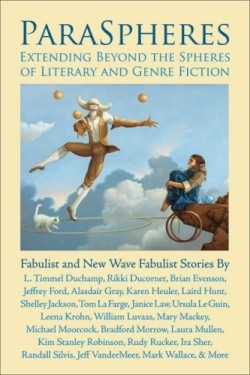ParaSpheres
Extending Beyond the Spheres of Literary and Genre Fiction
- 2006 INDIES Finalist
- Finalist, Anthologies (Adult Nonfiction)
Robin Caton’s “B. Longing” explores the nature of desire: “The desire to live is motionless, self-protective, internal. It wraps itself around the center of itself and clings. The desire to live seeks conjunction. The desire to live is and.” This story, one of fifty in this collection, is replete with wordplay and language puzzles woven around a sad fairy tale.
Paraspheres, an assemblage of experimental and fabulist fiction, offers something for everyone, even those inclined toward “literary” fiction. Such tales are often lumped in with genre fiction due to their strangeness of setting, character, or plot—yet these stories go beyond the classifications of fantasy, magical realism, and speculative fiction.
The editors, a husband-and-wife team, founded Omnidawn Publishing; Morrison has widely published essays and poems; Keegan is a consultant for non-profit corporations. They have sought out some fine examples of literary fiction with fantastic elements, and termed them “fabulist” and “New Wave fabulist” to separate them from genre fiction. This gives the stories greater cachet, while recognizing the ingenious mental devices that provide such impact.
Readers with no interest in scholarly discussions of literary terms (explored in the editor’s note and an article at the end of the book) can go straight to the stories, which are compelling, moving, amusing, and often profound. Some are so experimental in form or subject that the casual reader may choose not to pursue them despite their merit; others, such as “The Town News,” by Justin Courter, are simply such great tales that readers will find it easy to cry or laugh.
In Courter’s story, John can see how and when people will die. Normally he withdraws from their company, but Kathleen, the writer, is different. He becomes her caretaker and champion when her cancer takes over. As an exploration of the tenderness that one human can have for another, this story is outstanding: “I didn’t bother messing around with the wheelchair,” says John. “I carried her like she was my bride.”
Kim Stanley Robinson’s alternate history “The Lucky Strike” gives the reader bombardier Frank January, in a plane carrying the A-bomb after the Enola Gay crashes. January makes a gut-wrenching decision to follow his principles concerning acceptable wartime behavior. While his action results in a court martial and death sentence, he is at peace. He has brought about the termination of the war without the immolation that, in factual history, resulted from the bombings.
In “Finding the Words,” by Michael Constance, rogue word-memories (“animal” and “plant”) surface during a virtual reality game. Michael’s computer, which monitors all his thoughts, finally finds the meaning of those words, which have long been obsolete. Michael must choose between virtual and actual reality.
There is plenty more to challenge the imagination—and the status quo—in this excellent anthology of fabulist tales.
Disclosure: This article is not an endorsement, but a review. The publisher of this book provided free copies of the book to have their book reviewed by a professional reviewer. No fee was paid by the publisher for this review. Foreword Reviews only recommends books that we love. Foreword Magazine, Inc. is disclosing this in accordance with the Federal Trade Commission’s 16 CFR, Part 255.

